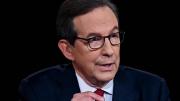In July 2018, Vladimir Putin and Donald Trump held a summit meeting in Helsinki, Finland. The U.S. intelligence agencies had by then concluded that Russian interlopers had meddled with the American presidential election of 2016. Dan Coats, President Trump’s appointee as director of national intelligence, concurred. Yet, in Helsinki, Trump apparently took Putin’s assertion that Russia had not interfered at face value, siding with him over American intelligence. Putin “just said it’s not Russia,” Trump declared. “I don’t see any reason why it would be.”
After the summit, one American journalist was permitted to interview President Putin face-to-face: Chris Wallace ’69, the longtime host of Fox News Sunday. “Putin likes to affect a disinterested manner, like a bad boy in the back of the classroom—sort of an ‘I’m putting up with you’ quality,” Wallace notes. Their interview began with big-picture issues—global terrorism, nuclear disarmament, policy toward Iran—but Wallace soon brought up the election. He also had a surprise in store for Putin.
“A prop is always a good thing to use if you can,” he explains. Three days earlier, in Washington, special counsel Robert Mueller had announced indictments of 12 Russian officials in the GRU, the Russian military’s foreign intelligence agency, for electoral interference. Wallace brought along a copy of the indictment, and with an outstretched hand, offered it to Putin.
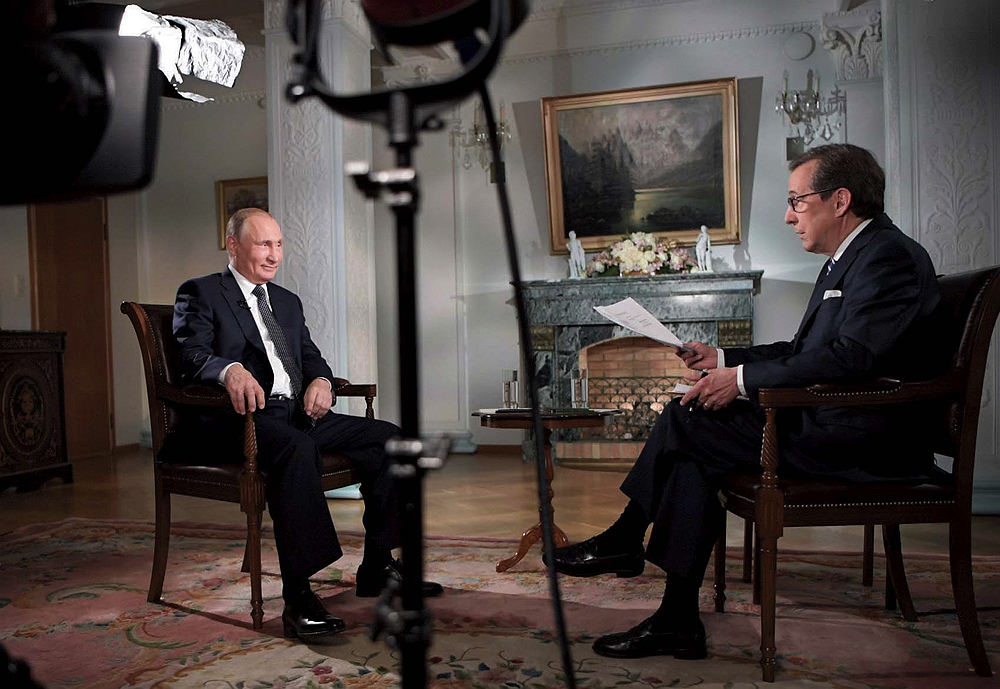
Tough questions for a tough cookie: Chris Wallace interviews Russian president Vladimir Putin, Helsinki, July 16, 2018.
Photograph by Alexei Nikolsky/TASS via Getty Images
“He can’t believe I’ve done this,” Wallace says. “He would not even touch the document. But from that point on, I had his undivided attention. The interview became thoughtful and useful.”
Yet Wallace wasn’t done. “I asked one great question near the end—‘Why do so many people who criticize you end up dead?’” He mentioned a few names. In the next room, his wife, Lorraine, heard the Russian security man standing beside her curse. Putin tried to change the subject, bringing up the assassinations of John F. Kennedy and Martin Luther King Jr. as examples of American leaders killed violently.
“Putin likes to fix you with those ice-blue eyes, a man-to-man kind of thing,” Wallace explains. “But hey, I’ve been doing this for half a century. I’m not shy about asking tough questions or dealing with world leaders. You have to have done your research. They know more than I do. But I know what I want to ask. You have to know enough to catch somebody if they start to ‘spin’ you—and if you do catch them, they will pay attention.”
Spinning facts, acts, and issues might reach its apotheosis in presidential debates. In 2016 Wallace became the first Fox News anchor to moderate a general-election presidential debate—the final one between Hillary Clinton and Donald Trump. “It was a great honor to be asked,” he says. “But it also meant overwhelming stress and anxiety. The stakes were high—the debate happened only 20 days before the election. You are playing a key role, and with 80 million people watching.”
Wallace tried to banish the pressure from his mind. PBS news anchor Jim Lehrer, LL.D. ’06, who had moderated several presidential debates, gave him some helpful counsel: to remember that the debate isn’t about the moderator, but about the candidates and the process; moderators are there to facilitate.
Even so, just beforehand, Wallace felt edgy enough to request divine intervention. “Dear Lord,” he prayed, “get me through these 90 minutes and I’ll never ask for anything again.” Airtime came, and “for the first couple of minutes, I had a kind of out-of-body experience,” he recalls. “I heard a voice and wondered, ‘Who is that?’ then realized it was me. Once we got going, though, it hit me: ‘What could be better than having the two presidential candidates all to yourself for an hour and a half?’” After the debate ended, Wallace was again moved to prayer. “Dear Lord, I know what I said,” this one began, “but could I have another chance in four years?”
Wallace reminded Trump, “Mr. President, you’re not the moderator.”
Well, be careful what you wish for. Wallace did get another chance, as moderator of the first Joe Biden-Trump debate in 2020. It was easily the most chaotic presidential debate in history. From the outset, Trump trashed the agreed-upon rules—interrupting, talking over, and badgering Biden—while ignoring time limits. At first, “I thought, ‘This is good, they are engaging each other—it isn’t just a side-by-side news conference,’” Wallace says. “But they weren’t debating. I realized that this isn’t so wonderful; instead of talking issues, it became a question of how to manage the president.” Wallace’s valiant attempts to do so got the president locking horns even with him. At one point, Wallace reminded Trump, “Mr. President, you’re not the moderator.”
At the end of the evening, Wallace wished he had moved to restore order earlier in the proceedings, although he knew he had done his best to manage an essentially unmanageable participant. For better or worse, what much of the audience took away from the pandemonium was a vivid impression of Trump’s rudeness, rather than much enlightenment about the issues.
The Commission on Presidential Debates reacted by changing the rules for succeeding debates. There’d be a microphone cutoff when a candidate’s speaking time had elapsed. Unsurprisingly, after the second debate fell apart (the candidates had separate televised events), the third debate went off in a far more civil manner. The New Yorker reported that when asked his thoughts about this, Wallace said simply, “I’m jealous.”
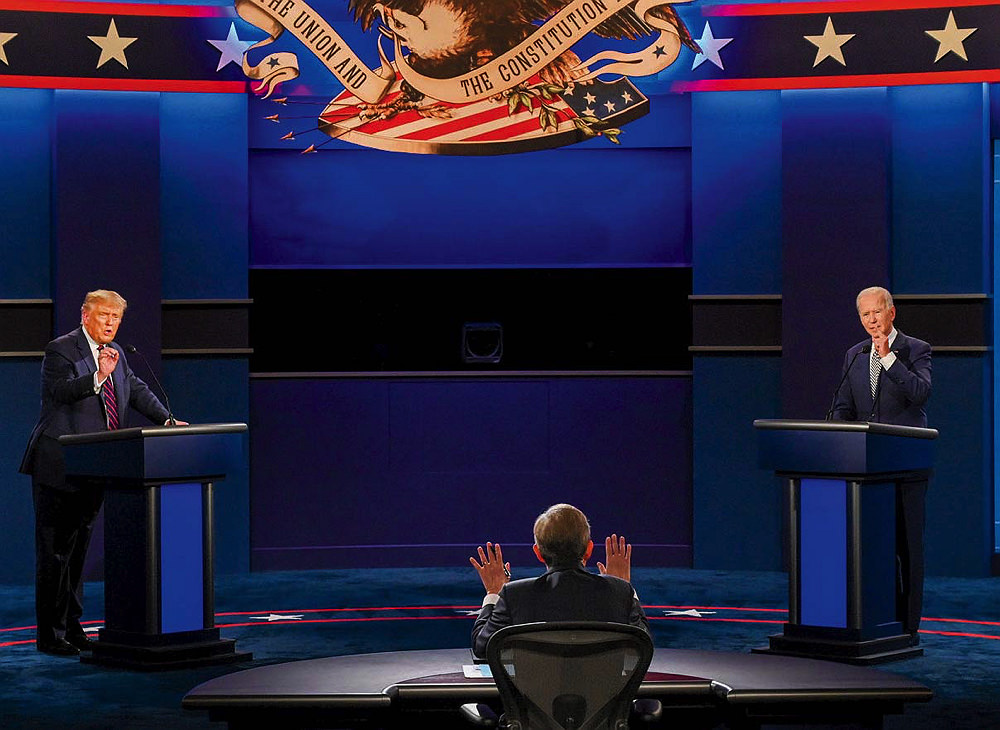
Attempting to referee the first debate, moderator Wallace raises his hands—to no avail.
Photograph by Jim Watson/AFP via Getty Images
Many might be jealous of Wallace’s “day job” as host of the weekly hour-long news program, Fox News Sunday, which marks its twenty-fifth anniversary on April 28. He has a long track record in that format; in fact, he is the only person to have anchored two Sunday public-affairs programs: NBC’s Meet the Press in 1987-88, and the Fox version since 2003. Each week, Wallace interviews newsmakers, ranging from Dr. Anthony Fauci, S.D. ’09, to Bill Gates ’77, LL.D. ’07, to Liz Cheney. There’s also Power Player of the Week, a feature that celebrates the likes of novelist James Patterson, endurance athlete Colin O’Brady, or cellist Yo-Yo Ma ’76, D.Mus. ’91.
His peers have recognized Wallace’s excellence. He has received three News & Documentary Emmy awards, a Peabody Award for outstanding public service in broadcast media, a George Polk Award honoring special achievement in journalism, and the Poynter Medal for Lifetime Achievement in Journalism. A 2018 survey by The Hollywood Reporter and Morning Consult placed Wallace among the 10 most trusted news hosts in the country. “For nearly two decades, Chris Wallace has had the toughest job of any television journalist, upholding journalism norms while at Fox News,” says Thomas Patterson, the Kennedy School’s Bradlee professor of government and the press and author of Informing the News. “Long one of the best interviewers on television, he’s been tough and fair to Democrats and Republicans alike, traits that all Americans got to see when he moderated 2016 and 2020 presidential debates. Attacks from right-wing die-hards haven’t bent his dedication to journalism standards by even as much as an inch.”
“By its very nature, the news is interesting,” Wallace says, reflecting on why he loves his work. “In many other jobs, I would get bored. Secondly, it’s a wonderful ‘forced education.’ I’ve gotten to travel the world, meet fascinating people, and learn about an amazing range of things. Third, we all like sharing stories, and this is an opportunity to do it.”
He is a straight-news type. He works in a different arena from Fox’s opinion merchants like Sean Hannity. “I don’t believe in spin,” Wallace says. “I don’t believe in pushing an agenda. I believe in the truth, and the truth is not negotiable. Donald Trump lost the election, and that’s non-negotiable. That’s the way I’ve done it for the past 50 years and I will continue doing it as long as I have a public platform. We all know who the opinion people are and who the straight-news people are—they do what they do, and I do what I do. I stay in my lane.”
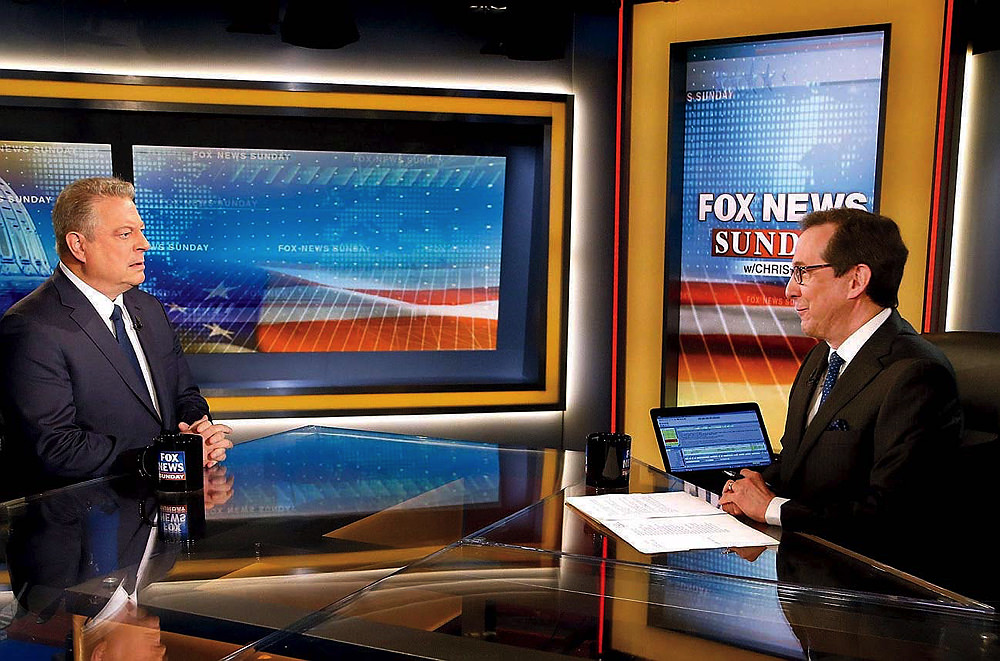
Former vice president Al Gore ’69, LL.D. ’94, discusses climate change on
Fox News Sunday with Chris Wallace, June 4, 2017.
Photograph by Paul Morigi/Getty Images
Wallace does have strong political views—even, one might add, extraordinarily well-informed ones. But he backs candidates rather than parties. He’s voted for Democrats, Republicans, and independents. He is a registered Democrat solely because, “living in D.C., it’s such an overwhelmingly Democratic city that if I want some say in who the next mayor will be, I need to vote in the Democratic primary.”
In 2003, when former Fox News president Roger Ailes interviewed Wallace for his job, “he was interested in me for what I did,” Wallace says. “He knew I wasn’t a guy who would sell certain political views. He asked me if I would be just as tough on Democrats as on Republicans. And yes, that’s what I do, I hold them all to account.”
Ailes held up his end of the deal. “Roger Ailes is the best boss I ever had,” Wallace says. “He was serious, solid, and kept his commitments. I’ve never been second-guessed about a question I asked anyone. What more could you ask? I’ve had a freer hand at Fox than I did working for ABC or NBC. I’ve loved my career at Fox.”
Wallace strives for unbiased reporting grounded in solid news-gathering, but he felt obliged to air his own views on one 2018 story that hit close to home. At a Senate Judiciary Committee hearing, Christine Blasey Ford accused Supreme Court nominee Brett Kavanaugh of having sexually assaulted her at a high-school party. On-air, Wallace described Ford’s testimony as “extremely emotional, extremely raw, and extremely credible.” He added that “Nobody could listen to her deliver those words and talk about the assault and the impact it had had on her life and not have your heart go out to her.”
Furthermore, in a family discussion of the allegations, two of Wallace’s daughters shared previously undisclosed experiences from their own high-school years in which they, too, had been victims of sexual misbehavior. “They hadn’t told their parents. I don’t know if they told their friends. Certainly they never reported it to the police,” Wallace said on Fox. Although the daughters’ experiences were less serious than those Ford described, “the point is that there are teenage girls who don’t tell stories to a lot of people, and then it comes up, and I don’t think we can disregard that,” Wallace asserted. “I don’t think we can disregard Christine Blasey Ford and the seriousness of this. I think that would be a big mistake.”
Wallace had been shocked and upset when former Fox News anchor Gretchen Carlson filed a sexual-harassment lawsuit against Ailes. Multiple women in the TV industry then stepped forward to accuse Ailes of unwanted groping and demands for sex in exchange for career opportunities. In the summer of 2016, Ailes resigned, and 21st Century Fox later settled Carlson’s suit for a reported $20 million, along with a public apology to her. “I was totally unaware of any of this going on,” Wallace says. “As the father of three daughters, I was horrified. He deserved to be fired. People have different sides to them. I loved working for Roger Ailes; good people do bad things.” (Of Bombshell, the 2019 film on the scandal, in which John Lithgow ’67, Ar.D. ’05, played Roger Ailes and Marc Evan Jackson played Wallace—with barely 30 seconds of screen time—Wallace says, “It was not a flattering movie. I was delighted to have such a small role.”)
The news anchor also makes splashes beyond the television screen. His 2020 book, Countdown 1945, written with Mitch Weiss, unfolds the suspenseful story of secret meetings and high-level debates during the 116 days between Franklin Delano Roosevelt’s death in April 1945 and the dropping of the atomic bomb on Hiroshima that August. “I wanted to write a historical thriller,” Wallace says. “Living out a critical historical moment through the eyes of the key players.”
Countdown 1945 became a New York Times bestseller and was well received critically. The Washington Post review called it a “taut and highly readable account” and compared it to John Hersey’s Hiroshima, in that the authors “humanize events too often reduced to technical or diplomatic arcana by telling their story through the lives of individuals.” Wallace is now working on a second “Countdown” book, this one about the search for Osama bin Laden’s hideaway and the political and military decisions that led to his killing in 2011. Unlike in news reporting, when writing nonfiction books, he says, “You are freer in telling stories about what happened behind the scenes.”
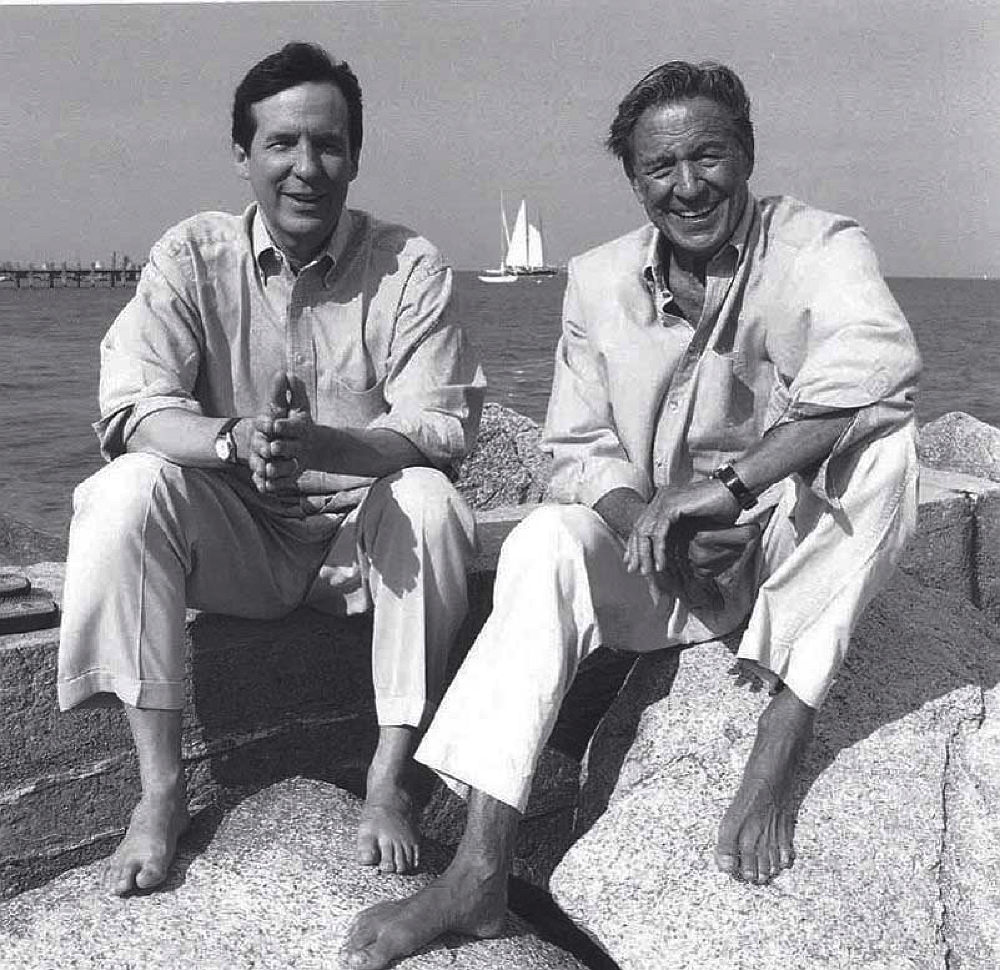
All in the broadcasting family: Chris Wallace with father Mike Wallace
Courtesy of Chris Wallace/Fox News
Exactly two years and six months after Harry Truman became president, Wallace was born on October 12, 1947, in Chicago. His parents, TV newsman Mike Wallace and Norma “Kappy” Kaphan, named him Christopher, as his birthday fell on Columbus Day. In his student days, he felt grateful for a day off from school on his birthday.
His parents separated when he was a year old, and he did not see his famous father for many years. In 1957, his mother married another broadcast journalist, Bill Leonard, who worked as a floor reporter at the 1952, 1956, and 1960 political conventions and later became president of CBS News, from 1979 until 1982. “My stepfather was the single most important person in my life,” Wallace says. For one thing, Leonard was deeply involved in political journalism: he served on the CBS Reports team, was executive producer of the network’s election coverage, and helped develop exit polling.
At the Hotchkiss School in Connecticut, Wallace did some sports reporting, making the football team unhappy one fall by describing its offensive line as “light but slow.” When he was 14, his older brother, Peter, died in a mountain-climbing accident in Greece. At the funeral, Chris reconnected with Mike Wallace, and the two developed a relationship that lasted for the rest of the older man’s life.
Mike Wallace advised his son to go to Harvard, while stepfather Bill Leonard favored Yale. Chris chose Harvard and joined the news department of WHRB-FM which, as he recalls, held “infinitely less prestige” on campus than The Harvard Crimson. Wallace covered the University Hall occupation in the spring of 1969, where, despite his press credential, police arrested him along with the demonstrators and locked everyone up in the Middlesex County jail. For his one allowed phone call, Wallace rang WHRB and filed a report from the jail cell, signing off, “This is Chris Wallace in custody” (see “Echoes of 1969,” March-April 2019).
The occupation’s fallout riveted and polarized the Harvard campus that spring. Wallace anchored live coverage of Faculty of Arts and Sciences meetings debating topics like ending ROTC on campus and establishing a department of Afro-American studies. As a college senior living through a tumultuous time, he naturally had strong feelings about the student demands under consideration. Reporting on them, he says, brought home “the difference between the story you’re covering and how it affects you personally.”
In his senior year, both Harvard and Yale law schools accepted him (at Yale, he would have been a classmate of Hillary Clinton). But Wallace decided that he didn’t want to go to school any longer, and got a job with The Boston Globe, where he spent four years as a general-assignment reporter who got to cover Boston City Hall. In newspaper work, he recalls, he “learned to write and report in depth on a story in a way you don’t do on TV.”
Yet television news had long interested him. In 1964 Bill Leonard had arranged a CBS internship that made his stepson a gofer to the network’s anchormen at the two political conventions. Wallace’s parents also socialized with Walter Cronkite, whose eldest daughter, Nancy, became Wallace’s first girlfriend.
While at the Globe, Wallace once returned a tape recorder to the newsroom but apparently forgot what he had recorded on it. When editor Matthew V. Storin happened to play back the tape, he heard Wallace rehearsing a TV newscaster’s voice by delivering a report on the Vietnam War. Storin had some fun by playing the recording over the PA system for the benefit of the entire newsroom staff. That embarrassed the young reporter, but by then it was already clear that print journalism wasn’t his final destination. In a Globe story years later, Storin described Wallace as having been an “excellent reporter,” as well as an “aggressive, ambitious” newsman. He added, “I’ve never been surprised by his success.”
An inflection point came at the 1972 Democratic National Convention, where Wallace noticed that his fellow print journalists were actually watching the convention proceedings on television. “I realized that I would rather be on the convention floor as a TV reporter,” he says. “There was a time when people in print looked down their noses at people in television. Conventions had a way of changing that.”
In 1973 he got a job at WBBM, a CBS affiliate station in his home town, Chicago. “It was still the era of Mayor Richard J. Daley, an old-fashioned political machine, ward bosses, and aldermen,” he remembers. “Great stories. I became a political reporter.” After a couple of years, CBS offered him a job at its Washington bureau, but “I needed to get out of CBS,” Wallace says. His two fathers, Mike Wallace and Bill Leonard, were both lions at that network and cast long shadows: “It was too close for comfort.”
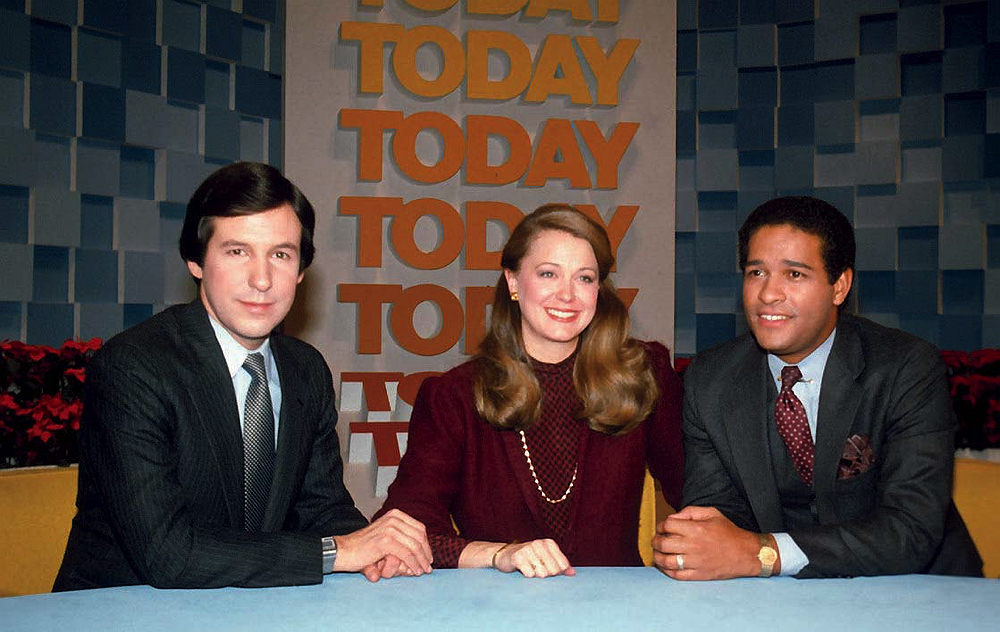
Earlier editions: Chris Wallace, Jane Pauley, and Bryant Gumbel on the set of the Today Show,
December 27, 1982.
>Photograph by Yvonne Hemsey/Getty Images
So in 1975 he became a local news reporter at WNBC in New York City, the flagship station of the NBC network. He joined the daily newscast with colleagues like Tom Snyder, Chuck Scarborough, and Betty Furness. Three years later, NBC promoted him to congressional reporting in Washington, where he also covered the Ronald Reagan-Jimmy Carter showdown of 1980. In 1982 Wallace became Washington co-anchor of the Today Show, alongside Bryant Gumbel and Jane Pauley, but “I was not morning-television fare,” he says, so the network made him its chief White House correspondent, a role he played from 1982 until 1989, in counterpoint to Lesley Stahl of CBS and Sam Donaldson of ABC. At different times, Wallace also anchored NBC Nightly News on Sundays and hosted Meet the Press. He reported on the final decade of the Cold War, including all four Reagan-Gorbachev summits.
But because NBC kept changing its news-division presidents, a given correspondent could fall into or out of favor accordingly. “One of the joys of ABC was that it had stable leadership, and if the top guy liked you, you stayed there,” Wallace says. So he was receptive when ABC’s Roone Arledge offered to bring him on board in 1989 as chief correspondent for Primetime Thursday—and as the frequent substitute anchor for Ted Koppel on Nightline. Right off, Wallace flew to Jerusalem, Warsaw, and Moscow, the latter places to report on the collapse of the Soviet empire.
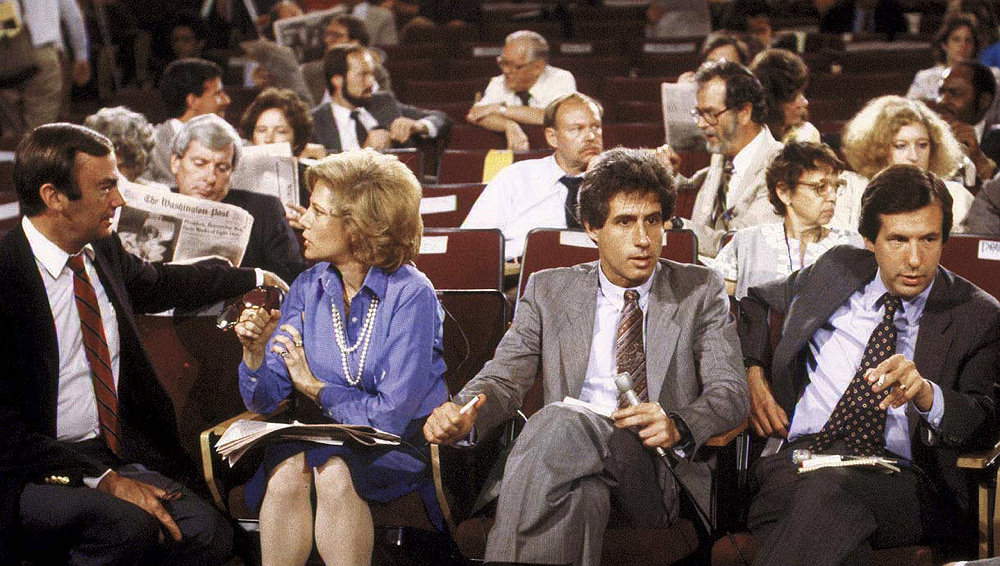
ABC’s Sam Donaldson, CBS’s Leslie Stahl, and (far right) NBC’s Chris Wallace gather for a news conference conducted by White House press secretary Larry M. Speakes, July 1, 1985.
Photograph by Diana Walker/The LIFE Images Collection via Getty Images
It wasn’t all international crises. In 1997, Wallace covered the Chicago Bulls basketball team for Primetime Thursday. The show arranged for him to play superstar Michael Jordan in a game of HORSE—in which whenever Player A makes a basket, Player B must replicate it to avoid “getting a letter” en route to spelling out H-O-R-S-E, and losing. At the outset Jordan suggested playing DOG, instead, to shorten the game, and they did. As it turned out, both men had D-O when Wallace made a shot. Jordan then missed his, prompting Wallace to say, “That would be DOG, wouldn’t it?” Jordan replied, “Weren’t we playing HORSE?”
On another occasion, Wallace had booked an interview with comedian Chris Rock for Primetime Thursday. On the day of the interview, Rock’s staff called to cancel. The reason? 60 Minutes had poached the interview. “This was like my worst fear,” Wallace told CBS Sunday Morning years later. “If it had been Morley [Safer] or Ed [Bradley], OK, not so bad. But it wasn’t.” Indeed, Mike Wallace, not atypically, had stolen an interview, this time from his own son.
Wallace asked his father, “Who is more im portant: Chris Rock or Chris Wallace?”
Wallace phoned his dad and said, “You’re going to have to decide who is more important: Chris Rock or Chris Wallace?”
Fifteen years later, at his father’s funeral, the son shared this story and, as a joke, fictionalized a coda, saying that there had been a long silence on the other end after the last question. Finally, Chris said, he’d prompted his father: “Mike?”
The father’s response: “I’m thinking!”
At that funeral in 2012, Chris Wallace began his eulogy by noting frankly that many in the audience at one point or another weren’t speaking to his father, whose hard-edged style irked many colleagues. Yet over the years, father and son developed an amiable relationship deepened by their shared field of television journalism. “We would talk about the TV business,” Wallace recalls. “Our relationship was good enough that we were free to say what we thought. I could criticize something he’d done on the air. We’d swap stories, talk about what worked. I believe your kids pick up not what you say, but what you do. My father’s professional standards, preparation, his drive and energy, influenced me. He was theatrically confrontational. On a story, we were both trying to get to the nub of the matter. The people we cover aren’t under subpoena, after all.”
The two men are vastly dissimilar, though, in family life. If two phone calls came in, one from a family member and one from CBS, Mike Wallace would predictably pick up the latter, his son recalls. In contrast, the twice-married Chris Wallace greatly enjoys the company of his four children from his first marriage, and of his two whom Lorraine brought along from her first marriage, to entertainer Dick Smothers. The couple wed in 1997 and their clan enjoys a robust family life that includes events like an annual putting contest with a dedicated trophy, “The Crab.” A highly competitive bunch, they’ve also battled each other in Trivial Pursuit and skeet shooting.
The rapid proliferation of media in recent decades has of course affected journalism profoundly. “It’s an infinitely less hierarchical system than it was in the ’70s,” Wallace says. “Cable, the internet, digital apps—the explosion of news sources recalls the Chairman Mao line, ‘Let a thousand flowers bloom.’” Alas, at least as many weeds as flowers are sprouting.
“There’s a bigger burden on the news consumer now to decide whom to believe and what has value,” he explains. “One source could be a guy in his pajamas ranting in the basement, while another is the vetted reporting of a professional news organization. Even so, I’m not particularly comfortable with the idea of gatekeepers; I’d rather have people come to their decisions on their own. You have to triangulate: conservatives need to read The New York Times, liberals need to watch Fox News. The Founding Fathers put their faith in us, and we have to live up to that.
“I may be the only person in news today who isn’t on Twitter or Facebook,” Wallace continues. “Social media give you one more opportunity to blow up your career. I’m constantly surprised to see reporters saying things on Twitter that they would never put on the page of a newspaper. They hurt their credibility—and I can live without that.”
One development that concerns Wallace deeply is the way slanted news coverage, traditionally considered a flaw in journalism, has evolved into a marketable feature of news media. “I find that one of the most disturbing developments in journalism over the past quarter-century,” he explains. “In many places, the business plan has become, ‘Tell people what they want to hear,’ and don’t worry about objective truth. Unfortunately, there is a large audience for people who confirm their viewers’ biases. People now choose their news like that kids’ book series, ‘Choose Your Own Adventure,’ which lets the reader decide how the story turns out.”
This polarizes the citizenry. News consumers now hold not only differing opinions, but sign up for different versions of the truth. “At the Globe in 1969, fair and accurate reporting kept you from getting fired—it was a basic requirement of the job,” Wallace says. “Now I get praised for playing it straight. If I stand out for that, it’s a sad commentary on where the news business has headed.”
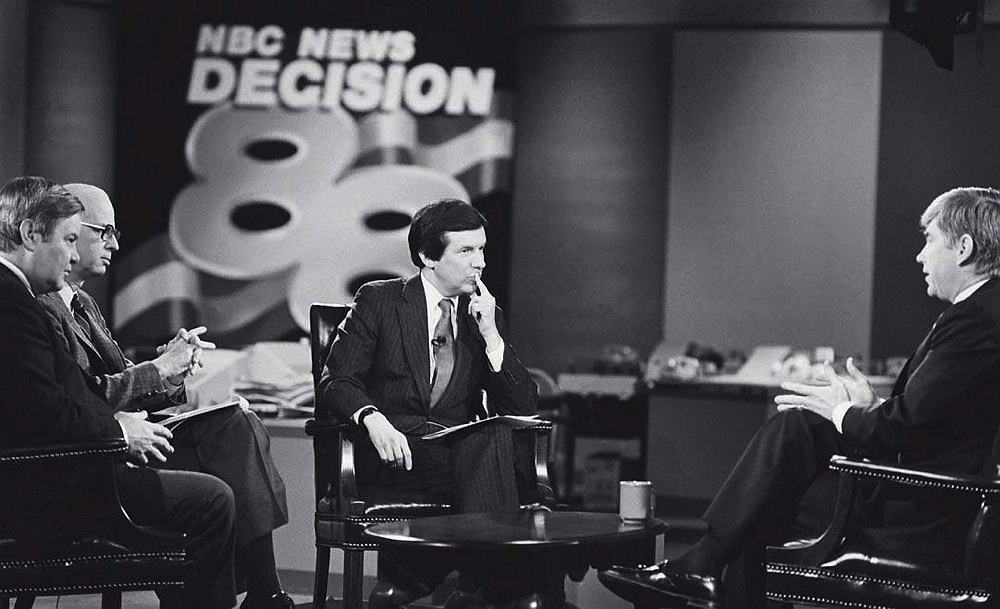
Meeting the press: On "Decision ’88: New Hampshire Primary," R.W. Apple Jr. (The New York Times), David Broder (The Washington Post), and moderator Chris Wallace (NBC News) question New York congressman Jack Kemp, a Republican presidential candidate, February 14, 1988.
Photograph by Roger Sandler/NBC/NBC Newswire/NBCUniversal via Getty Images
Much as he enjoys pondering the big issues, Wallace keeps his own lifestyle—well, fair and balanced. He and Lorraine are friendly with movie star George Clooney and his wife, Amal. Both men came from broadcast-journalism families, as Clooney’s father, Nick, was a news anchor. In 2012, George Clooney invited the Wallaces to visit for several days at his Italian villa on Lake Como, surely one of the world’s most beautiful places. During their stay, Fox News emailed Wallace, saying that Mitt Romney had just named Paul Ryan as his running mate, and would Chris like to fly back and interview Ryan?
Well, perhaps Mike Wallace would have been on the next plane, but Chris’s response was immediate and succinct: “Are you out of your mind?”
